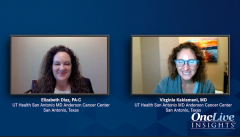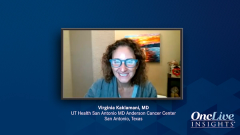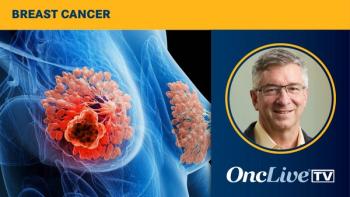
Safety and Efficacy of Sacituzumab Govitecan in the Treatment of HR+/HER2- mBC
Virginia Kaklamani, MD, and Elizabeth Diaz, PA-C, Diaz review the available safety and efficacy data from the TROPiCS-02 trial on the use of antibody drug conjugate sacituzumab govitecan for the treatment of HR+/HER2- metastatic breast cancer.
Episodes in this series

Virginia Kaklamani, MD: So, let's talk a little bit about sacituzumab govitecan and the data from the TROPiCS-02 trial. The TROPiCS-02 trial was a phase 3 clinical trial in the metastatic setting in patients with HR-positive, HER2-negative breast cancer. Those patients had received prior chemotherapy, including a taxane. Like this patient, the patients on the trial had received a taxane. Patients were randomized to either a physician's choice of chemotherapy or sacituzumab govitecan, and the primary endpoint of the trial was progression-free survival with secondary endpoints that included overall survival response rate toxicity, and so forth. The trial was a positive trial and showed a significant improvement in progression free survival favoring the use of sacituzumab govitecan; it also showed a significant improvement in overall survival, telling us again that sacituzumab govitecan in that second and third line setting, and most of these patients were receiving it as a third line drug, was beneficial, and more beneficial than chemotherapy.
This was a pivotal trial. It led to the approval of sacituzumab govitecan in patients with HR-positive metastatic breast cancer. Up until then, it was only approved in triple negative breast cancer.
So, Elizabeth, you mentioned a little bit about sacituzumab, but in your clinical practice, what is your experience in patients that are receiving sacituzumab govitecan?
Elizabeth Diaz, PA-C: I was involved in some of the trials also in our site and it's just an amazing drug. I was excited once it got to the clinic. Breast cancer patients are lucky to have a lot of good options. We've also seen really good results with our bladder cancer patients. It's pretty well tolerated. Like I said, the diarrhea is usually pretty easy to manage. We do have some dose reductions, though, with the neutropenia.
Virginia Kaklamani, MD: The neutropenia tends to be one of the issues. And I know when we when we had 2 or 3 of these trials open, we realized what we had to do if we wanted to keep patients on schedule was give them G-CSF [granulocyte colony stimulating factor] support during their treatment. The guidelines suggest that we can give G-CSF support as secondary prophylaxis for neutropenia. So that means wait until neutropenia happens and then give them G-CSF. We typically give it for primary prophylaxis, so the drug is given day 1 and day 8 of a 21-day cycle. So, I give long-acting G-CSF on day 8, that way I don't have to delay cycle to day 1.
Incidence of neutropenic fever is actually not that high, it's in the single digits. And so, we definitely can wait until a patient has more severe neutropenia and neutropenic fever to give the growth factor if we want to. I typically don't like those dose delays. I like patients staying on schedule if they can. And so, I've been giving it as primary prophylaxis with my first cycle. My patients for some reason can't take long-acting CSF. You can give short acting G-CSF after day 1 and then short acting again after day 8. And in my experience, it seems that the published data as far as toxicity and as far as efficacy is pretty similar to what we've seen in practice with this agent. So, we've been very lucky to have another good option for our patients with metastatic disease.






































